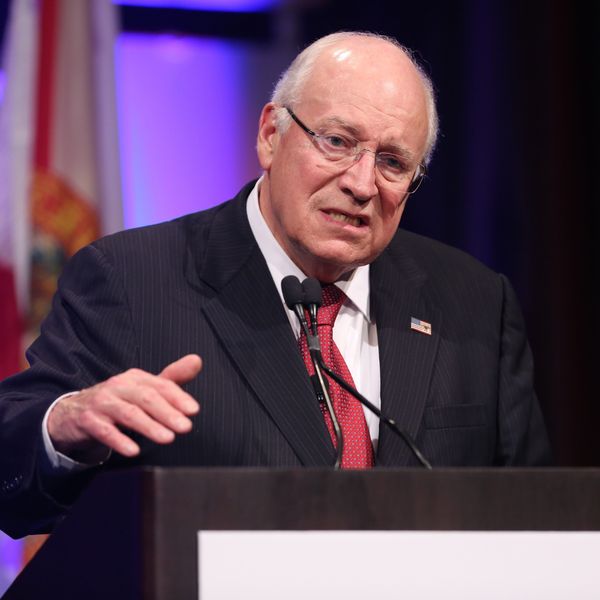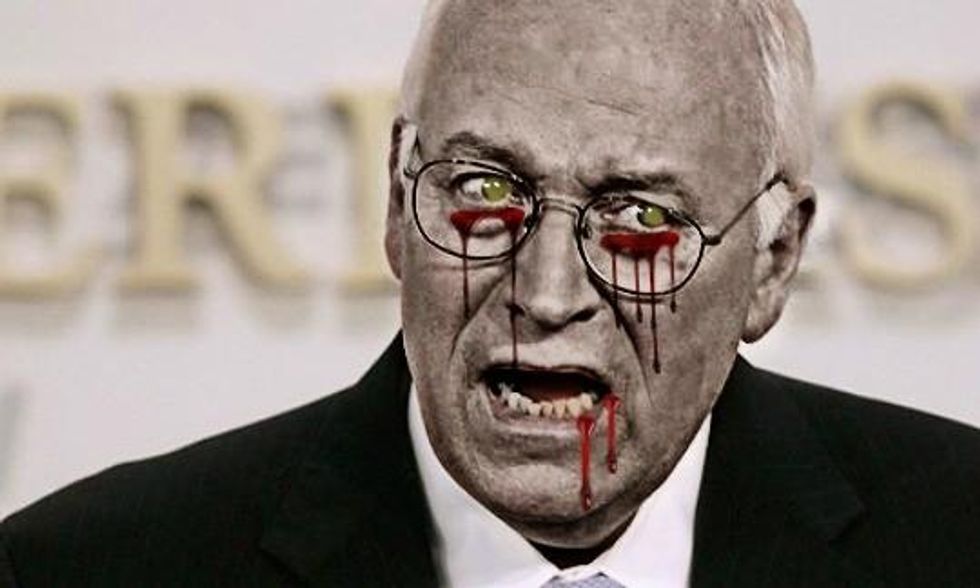A more primal part of me simply sees "Cheney", "heart" and "Halloween" and I clutch my own chest in fear.
The Republican party has even more to fear than I do. Cheney - never very shy with advice - has used his book tour to continue his relentless campaign on behalf of torture and totalitarian tactics. And he's using it, paradoxically, to insist that he and his daughter Liz (now running for Senate in Wyoming) are allies of the Tea Party and that he supports their cause. "These are Americans", he says, not so much as a rebuttal against an accusation but as an accusation itself.
The Tea Party "rebellion", says Cheney is "a normal, healthy reaction, and the fact that the GOP is having to adjust to it is positive." Less generally, he has offered that Liz is just the kind of adjustment Republicans need. "My own daughter is running for the US Senate in Wyoming," he not-at-all-self-servingly-brought up in one interview, "partly motivated by the concern that Washington's not working, that the system is breaking down and that it's time for new leadership."
Tea Party representatives have warmly greeted Cheney's advice and responded to his praise with an enthusiasm that betrays the insecurity anyone might feel if, you know, most of America thought they were obstructionist brats: "Guess which establishment Republican just stepped up to defend the Tea Party?" teased a headline at Glenn Beck's the Blaze. This excitement suggests they do not realize the risks of dealing with a cold-blooded opportunist like the former vice-president.
He is a survivor, it's true - but to turn to Cheney for advice about longevity is like interviewing the lone recovered castaway for tips on sea travel: you can ask him for his recipes but don't look too closely at the bones on the bottom of the boat. Put it another way: Cheney is approximately 1,000 years old and made up of spare parts; he thinks the GOP needs new blood. Be careful, guys, Cheney usually means that literally.
My understanding is that Dick Cheney is not very religious, and certainly not superstitious. Anyone who has cheated death as many times as he has (five heart attacks, everyone knows that - but also five deferments from service in Vietnam) perhaps cannot afford to think about what kind of karmic imbalance grows out of his continued existence. In Heart, he reveals that in the suspended animation of heart transplant surgery - the closest to death one can come - his reverie consisted not of any moral reckoning or even meditation on the life he'd lived, but a dream about living "in Italy, north of Rome, about 40 or 50 miles north of Rome, a nice little village, drinking good Italian wine and eating good Italian food. That's what I had in my head."
That should be the first clue to desperate Tea Partiers that their leadership antenna still points due wacky. Dick Cheney's idea of heaven is Casperia. Who's "European" now, huh?
Watching Cheney in these periodic re-emergences into the public spotlight can be disconcerting in general: as with a horror movie villain, you can never count on a credit sequence to put an end to your fright. But the mutual embrace between Cheney and the Tea Party is especially morbid.
In terms of policy and biography, Cheney represents much of what the Tea Party purports to correct. He remains a bloody, vindictive foreign policy hawk (recently advocating for military action in Iran) even as Tea Partiers trend toward skeptical isolationism. Whereas the Tea Party has found precarious common ground with liberals in criticizing security overreach, Cheney shamelessly argues the correctness of National Security Agency surveillance on, well, everyone:
Without speaking about any particular target or group of targets, that intelligence capability is enormously important to the United States, to our conduct in foreign policy, to defense matters, economic matters, and I'm a strong supporter of it.
Cheney's deep and abiding roots in the GOP establishment should be even more cause for caution. Cheney has been a creature of Washington since 1969, a 44-year streak whose very length belies any inclination toward insurrection, much less any sort of change.
What's more, Cheney was a directly elected representative for just ten of those years - the five terms he served as a Wyoming congressman. That seat is so safely Republican that he never won with less than 58% of the vote. And he represented just under 500,000 voters. That's not a mandate, that's the entire viewership of Morning Joe.
More disturbing, one might think, for the Tea Partiers who claim such fierce belief in democracy: for 80% of his career, Cheney has answered not to voters but to those already in power. And though conservatives are fond of late at championing "running a business", as superior to the public sector for learning about consequences, even Cheney's time at Halliburton can hardly be used as evidence of having to be accountable by any traditional meaning of the term. As Josh Marshall wrote in a grimly prescient 2003 profile of Cheney: success in military contracting doesn't come "by understanding and meeting the demands of millions of finicky customers, but by cementing relationships with and winning the support of a handful of powerful decision-makers".
Cheney's career has flourished precisely because he has always been insulated from the consequences of his decisions. He has never had to pay a price for being wrong. That he was the ghoulish architect of the Iraq tragedy is only the most obvious error in karmic accounting. He also advocated for the Treasury secretaries whose lack of finance industry experience helped bring about the 2008 economic meltdown - though, to be fair, Cheney was clueless himself. In 2009, he told the AP, "I wouldn't have predicted that," adding, "On the other hand, I wouldn't have predicted 9/11." If only we could have total surveillance of the financial sector!
Cheney also crafted (in secret) the energy policy that has kept us hurtling toward a climate disaster - well, in addition to the ones it has already caused. He pursued the detainee policy that has kept al-Qaida recruitment alive and he pushed for the same privatization of social security, the failure of which is commonly held to be George Bush's most obvious domestic misstep.
Cheney is probably the most popular remaining member of the Bush administration - which Tea Party members properly lampoon as "big government conservatism". Indeed, "big government" is perhaps the one concept that ties Cheney's worldview together. It is otherwise a mishmash of free-market wizardry and global cop role-playing. But if you think of "big government" not as a matter of regulatory or welfare-driven policies but just untrammeled power, well ... Cheney's ideology is not "left or right" so much as "might makes right." Or, given the importance Cheney seems to place on expediency, "might makes right now."
But I don't think Cheney's fans are even thinking about policy. It's about style and attitude, and Cheney's forbidding belligerence adds a needed bass note to the hysterical shouting of the Tea Party's current leading voices. Cheney's genius is that he delivers world-ending policy scenarios like a gruesome bedtime story. As reporter Nicolas Lehman puts it in a recent Cheney documentary, the vice-president's very delivery is weirdly seductive:
He wasn't going to be flaky or half-baked; he wasn't going to let his emotions distort his views, and he certainly wasn't going to be soft or naive.
That stentorian gravitas has served Cheney well, but I don't believe it's an accurate reflection of his personality. However gravely his voice, he is also thin-skinned and notorious for holding grudges, and I suspect that even his glad-handing of the Tea Party is merely in service of a larger goal: getting Liz elected. Making sure there's a Cheney at the center of Washington politics for another 50 years.
I'm as eager a student of horror novels as politics, but I don't usually get a chance to bring the wisdom of one field into the other. By way of wishing you a happy Halloween, let me also issue a reminder: the risk of bringing someone back from the dead is that they turn on you. When people play God, they only create monsters ... boo!




